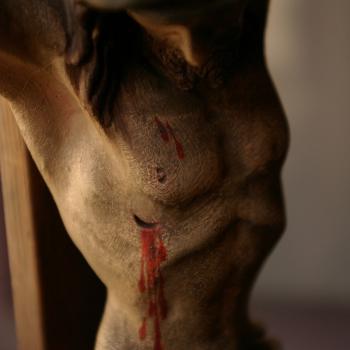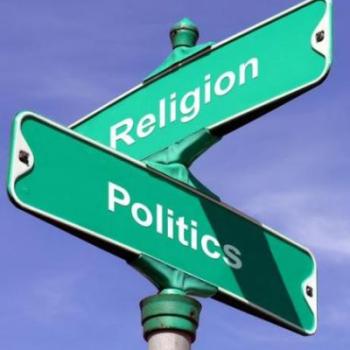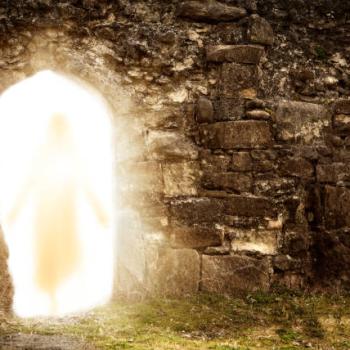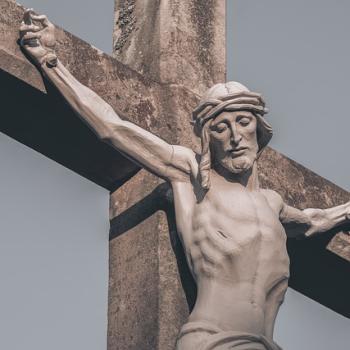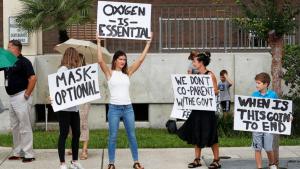
Imagine a person in a position of great influence and who lies about the danger of a virus and proper and improper medical interventions. Suppose as a result that virus kills half a million people that otherwise wouldn’t have died. I seems to me that liar would be guilty of that many murders. Now what is your moral risk if your political beliefs incline you to believe those lies? Say you take to social media to spread false information about the virus or masking or vaccinations. What is your moral risk then? Do you own a share of those half a million murders?
I write this because I am a Catholic and I see the Church giving correct advice about vaccines and more or less correct information about mask wearing in churches. I also see the Church use its powerful language of sin and culture of death on some issues, like abortion, but not on others where it is equally appropriate. There are many more than one moral risk that Catholics in the midst of this culture of death face.
Moral risk at a Catholic school
Very close to home now, imagine my daughter working for a Catholic school system. She writes a letter to parents explaining the school’s position on wearing masks. It is following the best science and CDC recommendations by instituting a mask mandate for all students and staff. Before the letter goes out, one hundred parents e-mail her immediate supervisor threatening to pull their students out of school if a masks are required. As if that weren’t enough, some teachers and even a principal threaten to quit if there’s a mask mandate.
This boss changes the letter, and it goes out informing parents that the school recommends, but does not mandate, mask wearing. Through negligence, the part about best science and the CDC remains in the letter.
This happens to be a city with a high level of Covid transmission, whose public schools require masks for all students and staff. There also happens to be nearby a school system that has already opened without a mask mandate and had to send hundreds of students into quarantine its first week. This district too now requires masks.
How do you evaluate moral risk? How do you weigh a school’s finances and even survival versus possible sickness and death among its students and staff? What moral risk faces a bishop, who has the final say on Catholic school systems in the diocese? What should the Church be telling parents on an issue where there is clear scientific evidence but unwillingness on the part of many to believe it?
The Church tries to teach the moral truth, but what about when morality becomes entangled with science? What moral risk does the individual face who has to navigate between information and disinformation? What about the pastor deliberating about a homily when politics is a large part of the mix?
Science, politics, morality, and a culture of death
For a century Christians have operated with the convenient assumption that the Church could take care of morality, souls, and the path to heaven and leave “secular” things like politics and science to other authorities. The prolife movement abandoned that “separation of church and state” myth on the issue of abortion. And the Church as an institution has felt qualified to pronounce on the science of fetal development and the politics of legal rights for unborn “babies.”
This could be a healthy development for the Church, but not if it stops with abortion. Not if we shout loud on abortion but waffle and whisper on masks and vaccinations or any issue (think global warming) where science, politics, and morality converge. Then the Church will face its own moral risk — being politically active, appropriately, but also and inappropriately politically biased.
The culture of death rates the lives of babies less than, in some cases, the personal inconvenience of bearing children. In many other cases it’s the societal inconvenience of actually supporting women with difficult pregnancies that outranks human life. A culture of death values economic progress and free-market ideology higher than the obligation to live sustainably on the earth. When it comes to keeping schools safe in a time of pandemic, the culture of death has another tack. It says believing that laws and rules meant to keep people safe are an infringement on their constitutional rights and god-given freedom.
Moral risk and the cult of “freedom”
In this country many people, including Catholics, do not know the meaning of freedom. They make a big deal out of not being told what to do, especially by a political leader. The Declaration of Independence (“life, liberty, and the pursuit of happiness”) doesn’t define liberty, but the context makes it clear that what is meant is freedom from coercion.
In the new context of mask and vaccination mandates—or facing up to global warming—I would like to hear some really relevant sermons. Sermons on freedom from along with its necessary corrective, freedom for life in a community of virtue. The only true freedom is freedom to do right and avoid doing wrong. That necessarily includes the freedom to know the difference, freedom to know the truth. Consequently the Church has an obligation to teach the truth, including, at times like these, scientific truth. Could those hypothetical sermons be a time for the Church to talk science, even if politically messy, to help Catholics tell truth from lie, information from disinformation?



